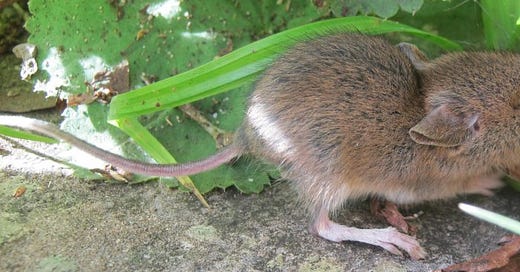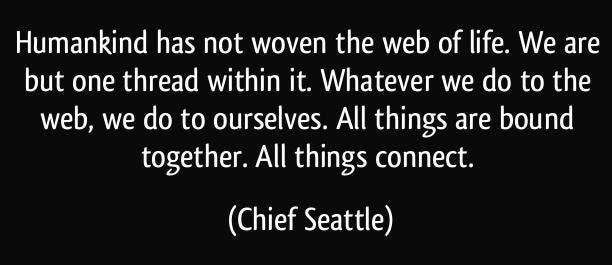The way we see the world shapes the way we treat it. If a mountain is a deity, not a pile of ore; if a river is one of the veins of the land, not potential irrigation water; if a forest is a sacred grove, not timber; if other species are biological kin, not resources; or if the planet is our mother, not an opportunity – then we will treat each other with greater respect. This is the challenge, to look at the world from a different perspective. David Suzuki
Mouse
It’s pre-dawn here in the northern hemisphere, late November, and chill. The sky has that deep ink-blue translucence that announces at least the promise of the return of the light. As I walk up the lane the moon, only just past full, makes lino-cuts of the bare branches and adds a splash of magic to the trees, as only the moon can.
My hands are cold, especially the right one, which is carefully transporting a small cargo: a baby mouse, captive in the humane trap, huddled in one corner: so sweet, so perfectly beautiful, that actually I want to put it into my pocket and carry it around with me.
What I’m doing, though, is carrying it up the lane as far as the dense copse, where I will let it out and hope that it might meet up with its siblings; and survive. Supposedly, you should release mice about a mile away from where they were if you don’t want them to return. I haven’t gone a mile; if I do that I’ll be letting it out by someone else’s house. I tell myself it’s such a baby it won’t have any idea of where it was living.
As I open the trap, it leaps out, and I tip a cashew nut and a small piece of cheese out after it (clearly it was too frightened to eat in the trap) as a kind of offering, tiny rations for the journey. I’ve loosed it into deep briars and twiggy undergrowth, and am counting on beech mast, pine cones, berries perhaps, chestnuts, to keep it going.
As I step back a tawny owl flies over, then its mate. I’ve heard that owls and other raptors track down prey by following urine trails, which they perceive in ultraviolet. I can’t. I can’t let myself add guilt and worry over this one small mouse to my burden of anxiety about so many things, whether family unhappinesses, the horrors of industrial animal agriculture and hunting, both so rife in Brittany (as of course elsewhere), or the wider human tragedies: Gaza, Ukraine, climate change, violence and starvation. The grip of the pharmaceutical companies; the grip of the fossil-fuel companies; the grip of multinational industrial agriculture, and its cruelties. It’s hard enough to sleep at night as is.
And there is another reason why it’s hard to sleep at night (and I’m someone who is seriously, chronically, short on sleep anyway): there are clearly mice in the kitchen at night; they drive one of the dogs so crazy that he can bark for hour after hour, and we sleep directly above the kitchen.
This is a very old house, in parts, anyway, and there are many places where mice can enter. This is the time of year when they do. I have two humane traps out for them.
This is young mouse #4.
How might we live…
I talk about co-habiting with the other-than-human – where do we draw the line?
My own line is that I will not kill them, nor anything else if I can help it; nor be complicit in killing.
‘All beings tremble before danger, all beings fear death,’ I read in the ancient Pali text The Dhammapada, written 250 years, approximately, before the birth of Christ. Being 16 and impressionable, and working out how I wanted to live, this had quite an impact on me.
Having spent my whole life in rural areas and around many animals (including quite a number of mice), I knew from direct observation the truth of those words. It’s a choice, killing; and it’s also a choice eating animals, not a necessity (unless you are eg Inuit).
You know how there are times in one’s life when things come together after a period of being lost in the mists, and you know now what you need to do? I was of course going through all the usual adolescent questioning. This was the push I needed to stop eating animals. (Becoming vegan was a whole other thing, and took me another 40 years.)
So – back to the mice – when friends say ‘You have to poison them,’ I ask: ‘Why?’ Quite apart from my own wish not to kill, I have seen too many emaciated and dying buzzards and owls, usually but not always on or near farms, who have clearly eaten rats or mice who have eaten rat poison. It’s a nasty way for anyone to die.
I say this, and the truth is I don’t know what I would do if we had a serious infiltration of rats rather than mice.
But I could write a tale or two (I shall resist saying ‘tail or two’) about my history with mice: perhaps I might, later.
Other: a ‘resource’ or a ‘pest’?
Meantime, something that exercises me is how we tend to classify other species as either a ‘resource’ or a ‘pest’ in relation entirely to our species. If it’s a resource, a commodity, we exploit it as another object in our extractive economy. If it’s a pest, we eliminate it. In doing either, we are making Other into an ‘it’. As a species, we don’t seem for the most part to question why we think we can merely help ourselves to what our appetites desire regardless of the cost to Other; or conversely, get rid of it.
In either case, it’s extracted from the web of life in which we all have our own part to play, large or minute. The web depends on all of us in the interdependent relationships that co-create it, and that are destroyed at immense cost; as we all know, potentially at the cost of life on this little planet.
We have such a complex relationship with our other-than-human kin, don’t we? And it seems so arbitrary. I came across a book title the other day: Why we Love Dogs, Eat Pigs and Wear Cows, which says so much. ‘An absorbing examination of why humans feel affection and compassion for certain animals but are callous to the suffering of others.’
As you might have noticed from my posts, or from the ‘About’ section, my preoccupation is how we can re-engage in sustainable and sustaining relationships based on reciprocity, not exploitation.
Karma
All our actions have consequences, whether or not we are aware of them. This is the real meaning of the idea of karma.
It has to start somewhere, and right now, for me, it starts just before dawn with this young mouse. These dilemmas of trying to live an examined life. I am displacing this mouse, and putting my own health above its; I recognise this. But I am not knowingly harming or killing it.
And it will probably continue tomorrow, or after tomorrow, until we no longer have mice launching themselves down from a crack – well, a gap – where the ceiling joins the wonky ancient walls where someone (not TM) did a terrible job of finishing off, to land on a wall-light, off which it leaps to the floor by the woodburner in front of 4 pairs of eyes, if you include the dogs, who were clearly as astounded as we were, and took far too long to process what they’d just witnessed.
So these kin of ours in the web of life that sustains us all on our journey on this 4.5 billion-year-old planet (from the Greek for ‘wanderer’) as it travels round our star at more than 18 miles per second. This little planet of ours, spinning in limitless space: don’t we owe it to the Mystery to get to know, and to love, to cherish, our neighbours?
Even if we then decide we don’t want to co-habit under exactly the same roof…
A small PS if you read the last post: ‘Lunch for the ancient Britons’. Errmm. I got some things wrong. We were the youngest by quite a long way. Almost everyone else was an ancient Breton. The singalong was dire, though the hurdygurdy woman was OK. And vegans and vegetarians don’t eat fish even if it’s free.






It is a common understanding that we have ‘rights’ towards any resources that this planet holds, including all sentient beings. Yet we don’t have any ‘rights’ at all. What we are given is a gift. What we have is a responsibility, a moral duty to absolutely everything, and I know many readers here will share these sentiments.
We need to step back and look, take a good deep breath, and nurture unrelenting gratitude and compassion.
Thank you Roselle for your inspiring words.
Beautiful. I use to be a public health officer, and learned that the best way to deal with mice is to be really careful about any sort of spilt crumbs (or dog kibble.) They only go where they can find food and shelter, and there is no way to keep them out of an old structure. Thank you for showing the little fella the compassion it deserves. I love the title, 7 of Mice.